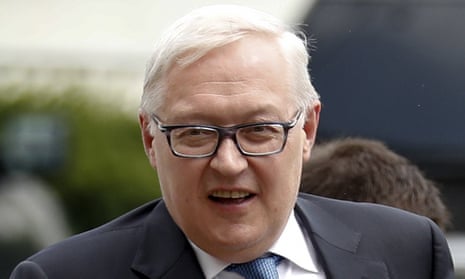Senior Russian officials have lashed out at the United States after Donald Trump announced his intention to withdraw from an arms control treaty.
The intermediate-range nuclear forces (INF) treaty, signed in 1987, has historically kept nuclear missiles out of Europe. The US president has accused Russia of violating the treaty first and told reporters on Saturday that the US would “have to develop those weapons” in response.
The decision has provoked anger in Russia, where officials deny they have deployed any short- or medium-range missiles. Russia has demanded explanations from the hawkish US national security adviser, John Bolton. The Guardian reported on Friday that he was behind the push to withdraw from INF.
On Sunday, the deputy foreign minister, Sergey Ryabkov, described Trump’s announcement as a “very dangerous step” and “blackmail to forcefully get certain concessions in a number of areas”.
“In contrast with US colleagues, we realise how serious the matter is and how it is important for security and strategic stability, and we again call on all those people who set the tone in Washington to show a balanced and sober approach,” Ryabkov said.
The former Communist leader Mikhail Gorbachev, who signed the treaty, also criticised the Trump administration’s decision, calling it a mistake. The withdrawal “would undermine all the efforts made by the leaders of the USSR and the USA to achieve nuclear disarmament”.
The treaty bans land-based missiles with a range of 500-5,500 km, targeting nuclear weapons based on the European continent at the time. Concluded by Ronald Reagan and Mikhail Gorbachev in 1987, it is one of several landmark arms treaties to face annulment in recent years. The 2010 new strategic arms reduction treaty, which is set to expire in 2021, has also been targeted by Bolton. Former US officials say he has blocked talks on extending that treaty.
Russian lawmakers, who have limited influence but often share the Kremlin’s point of view, criticised the Trump administration’s announcement.
Konstantin Kosachyov, the head of the Russian Federation Council’s foreign affairs committee, said that the US was seeking “unilateral military superiority”.
“The United States is looking for every opportunity to destroy the system of agreements on the global balance of nuclear forces that was established during the cold war years,” he wrote on his Facebook page, a clearinghouse for his political statements.
In the US, the Republican senator Rand Paul of Kentucky summed up alarm across the political spectrum when he told Fox News Sunday it would be “a big, big mistake to flippantly get out of this historic agreement”.
Another Republican senator, Bob Corker of Tennessee, said he hoped Trump’s intervention was “just a move” to achieve a new deal, in the way the president threatened then renegotiated the Nafta trade agreement.
The US says that Russia has already violated the treaty by developing a new cruise missile. Withdrawal from the treaty would mark a sharp break in US arms control policy and would face opposition within the state department and Pentagon. The INF already faces a congressionally imposed deadline early next year.
The US ambassador to Nato warned Russia earlier this month that if it did not halt the development of a new cruise missile in violation of a treaty between the countries, the US would “take out” the missile. A senior American general accused Russia of deploying the missile last year in remarks to the House armed services committee.
Russia has increased criticism this year of the US exit from arms control agreements, including the Bush administration’s decision in 2001 to leave the anti-ballistic missile (ABM) treaty signed in 1972. Putin has blamed the US for “creating the conditions for a new arms race”.
